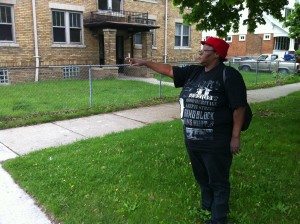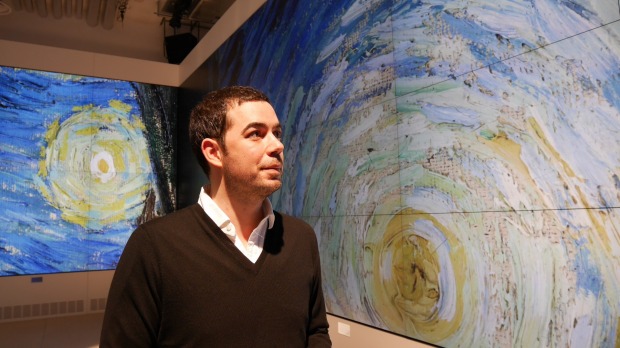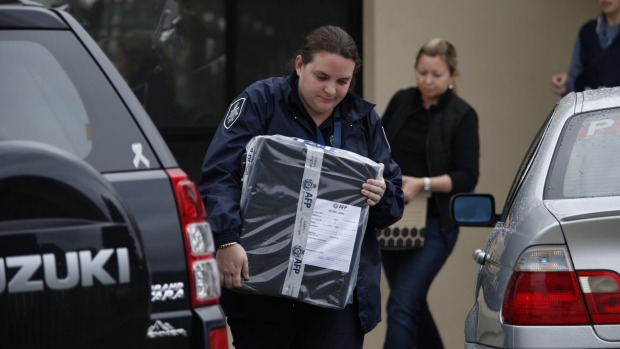Mean streets redux

I went to Detroit to cover the murder of an Australian property developer.
Some of my reportage did not make the final story.
For posterity, here is an earlier draft, before Chris’s (excellent) reporting from Australia was added.
By Nick Miller
Greg McNicol’s paint-stained work shirt still lies on a bench at 4110 Beniteau St, Detroit, where he took it off while sanding a new kitchen cabinet on the day he was killed.
Mother’s Day weekend was one of the first pleasant weekends of 2011’s unreliable spring, nudging up to 18 degrees. From the window the Australian expat could see his favourite tree in the vacant block across the road, the one he liked to lean up against and enjoy a beer and a smoke under a broad John Wayne-style hat. But that would be an indulgence for later.
He was hard at work on his project since March: renovating an old 10-unit apartment block he had just bought in the suburbs of this troubled city.
Today was the turn of a ground floor apartment. Sheetrock walls needed replacing and painting. He had to rip out the filthy toilet, replace the kitchen countertop, sand the kitchen drawers, build a cabinet. All in a day’s work, with paintbrushes ready for the day after.
Greg had been waiting for this Saturday. When he bought the place it came with several undesirable tenants. According to neighbours there were fights, screaming, drug deals. Some apartments were a stinking mess. Finally, Friday, he had persuaded one lot to leave, and with a sigh of relief he set to work, bringing out the beauty that the old wooden floorboards suggested lay beneath the grime and neglect.
“This place is a diamond in the rough,” says upstairs neighbour Florida ‘Flo’ Benton. “He saw what I saw. What it could be.”
But Greg will never see it come good. At the end of that day’s work he had an argument with some tenants he wanted to evict. And at the end of that argument he was dead, bled to death from a single gunshot wound in the groin, lying on the road outside his home as Flo told him he would be ok.
The secret to being an entrepreneur… isn’t much of a secret. It boils down to: buy low. And Detroit has plenty of opportunity to buy low.
The foreclosure crisis that hit the USA property market didn’t spare this city. The median price of a house in 2009 was $67,000, and could be less now (Greg bought this ten-apartment block for well under $100,000). But the stats are increasingly flaky, because the number of property sales has also plummeted. Just four years ago 7000 homes were changing hands each quarter, now it is less than 2000.
Unable to pay their mortgages, many residents have simply left home. In the last decade, the number of unoccupied houses in the city has more than doubled. In 2010, one in four Detroit homes stood empty.
Greg saw an opportunity.
In the north-eastern suburbs early this year he found… well, not exactly the worst building on the best street. It is a pleasantly tree-lined street near an industrial estate. A couple of gangs stalk the predominantly African American area (more than two-thirds of Detroit’s population is black) but most of Beniteau St’s people are house-proud homeowners.
Karen James is the property manager at 4110 Beniteau St and has known Greg more than a year, helping him with several purchases around Detroit.
She says his plan was simple. Find cheap properties with hidden potential (she repeatedly calls the Beniteau place a “steal”), fix them up, find good tenants and generate cash flow.
Most of the work he would do on his own, living in one apartment while fixing others.
“He was a great person,” Karen says. “A hard working, fun guy. And very smart. He basically knew how to do everything – plumbing, roofing, he could do it all.”
It might seem odd for a man with means to stay in a run-down apartment in suburban Detroit. But Greg had to.
“It’s hard to do (that kind of renovation) in Detroit,” Karen says. “If you leave a property for a while, then when you come back it’s stripped down to the guts. You need to put good tenants in there before you can leave.”
Greg bought the Beniteau place in February. It was run down (Florida Benton calls it “raggedy”), and plagued with vermin and tenants who didn’t pay rent. But it was structurally sound, the apartments individually metred.
When Florida moved in in March with her son, two of the building’s first new tenants under the new ownership, the power wasn’t on and the front door didn’t lock.
She set about painting a cool white over the riot of colours the previous tenants had preferred (Flo: “I said, who came here in a paint explosion?”). That’s when she met Greg.
“He had just got here from LA and he had taken the exact apartment I said I didn’t want,” she says. They sized each other up. He ran an electrical cord down from his apartment to theirs and lent them lights so they could see what they were painting. They chatted as they worked.
“He would always talk about this or that chicken place. I asked when was the last time you had a home cooked meal.”
So Flo cooked up soul food. Corn on the cob, Jiffy cornbread and candied yams. Turnips and mustard greens. Greg loved it.
“He said how do you expect me to eat them without a fork, Flo? I pinched the cornbread with the greens in my fingers and I said use your God-given fork.”
Greg confided with Flo his plan to buy the empty block next door, the one with his favourite tree, as a carpark for tenants with grassy areas with picnic tables for families to play.
And they became friends. She called him the Crocodile Hunter and said ‘hello matey’. Flo would feed him soul food and watch as he set to work on the renovations. But she also saw the tension, as he tried to choose tenants that matched his vision for the building.
“He said Flo, I want a family building here,” she says. “Here in Detroit he wanted to grab some of the property. He knew he could make money in the city. He wanted to be part of the rebuilding process. You could get one of these old, gutted out places and turn out the bad element, turn it into something.”
But that Saturday afternoon, while taking a break from work, Greg found himself in an argument with some female tenants on the pavement outside.
They were not paying the rent. Greg wanted to evict them.
The argument became heated. Flo says he was telling them he wanted them to leave. They were calling him names, waving their arms.
“He wasn’t going to allow them to bully him,” Flo says.
One of them was heard to say “call Daddy”.
A short time later a black Chevy Avalanche pickup truck pulled up. A man jumped out and shot Greg once from about 5m away, got back in the truck and drove away.
Lieutenant Dwane Blackmon, commanding officer for homicide at City of Detroit police department, confirms there was just one shot.
“It was a devastating shot though,” he says.
It hit Greg in the groin, severing a main artery.
“I was running to him,” Flo says, her voice breaking just a little. “He tried to walk then he collapsed down to his knees. I said lay on down, lay on down. You are going to be ok. Hold still, you are going to be ok.”
Karen had just arrived, after receiving phone calls about the argument. She heard the gunshot and came running.
“He was on the ground. Wow, I was just really in shock. I was calling his name. It was just shocking, just awful.”
While waiting for an ambulance neighbours came out to help, from houses up and down the street. They were angry – in a short time many had come to know and like the man. They brought bandages and put pressure on the wound. There was blood everywhere. Flo talked to him, but he said little in reply.
“He mentioned something about dying,” Flo says. “I said don’t talk like that.”
The ambulance came, too late to save Greg.
Less than a week later police arrested the alleged shooter, the father of the woman with whom Greg was arguing.
Freddie Young, 62, worked in a US postal mail warehouse where, police believe, he recently won a $1 million share in a big lottery draw. Now he sits in jail facing the rest of his life in prison on a first-degree murder charge. Karen calls him “a piece of work”. Lieut. Blackmon calls the crime “senseless”.
Around three quarters of homicides in Detroit are gun related. Part of standard police procedure is to collect guns off the street, every day, if they are carried illegally. But few deaths are like this one.
“We investigate numerous homicides. Sometimes there are reasons, homicides that occur on being so upset or mad,” he says. “But that’s the part we don’t understand with Mr Young. We don’t know that there was any confrontation, we don’t know if he even knew Mr McNicol. And he has destroyed Mr McNicol’s life and his own life also.”
Flo says she wants to see Greg’s vision come true.
“I think the start of it is so sad and so unnecessary. But I think the finish of it is what’s going to tell the whole tale. We have a lot of riff raff just like everywhere, but everywhere you go you can find some good. Detroit right now is one of those cities. We have a lot of negative going on, but a lot of positive, too.”
She has not given up on Greg’s dream because she refuses to give up on Detroit.
“Detroit is not a bad place,” she says.
It might not be a bad place, but it is currently in a bad place.
Downtown Detroit feels like the set of a post-apocalyptic movie. Grand, beautiful 1950s corporate offices rot in the heart of the CBD, empty, smashed and boarded up. Tour operators promote ‘Ruins of Detroit’ trips to enormous abandoned factories, hotels and theatres. Potholes dot the wide streets, which even in rush hourhave an empty air, as if the city had dressed in a bigger city’s clothes by mistake.
The latest census numbers told the tale. Detroit lost almost a quarter of its population in the last decade. A city of 1.8 million in 1950 now has 714,000, with another 200,000 predicted to leave in the next decade. Experts point to poor schools, collapsing infrastructure and high unemployment driving away the middle class. The city is losing its youth fastest: the city has less than two-thirds the number of people under 18 than it did in 2000.
Rip Rapson, president of the philanthropic Kresge Foundation, says the question of how to turn Detroit around is one of the most difficult and important in American urban policy. “Virtually every dimension of the city’s social, economic, environmental and physical landscape has to be rethought,” he wrote in a report on the city’s downward cycle.
In 2009 Detroit saw almost as many murders as New York (202), despite having a tenth the population. Almost half the population are functionally illiterate.
There are signs of renewal. Builders bustle on a soon-to-be-tourist-friendly riverfront, next to the futuristic glass Renaissance Towers which house offices and shops. Basketball-legend-turned-mayor Dave Bing beams down from billboards saying “I’m a believer, are you?”, trying to build groups of volunteers to work on the city’s practical and image problems (though he rejected a Twitter campaign for a new statue of Robocop, the city’s fictional 1980s protector).
Flo insists on seeing the good side of Detroit. And she says Greg, and people like him, will save the city.
“We just happen to be going through a famine, you know? But the leadership is changing in this city and we know it’s going to get even better.
“There are people like Greg taking a chance in Detroit, who are not going to get stopped. They are the type of stories that don’t get out, you just hear about people who get gunned or carjacked.
“This time next year this property will be thriving, the way he knew it would. His life won’t be in vain.”
But Karen is less optimistic.
“Detroit needs people like Greg,” she says. “But it (also) needs people that are not going to stand people who walk into a neighbourhood and shoot down landlords.”
Lieut. Blackmon doesn’t want this story to be about Detroit at all.
“I don’t take in all that and equate it to Detroit,” he says. “I equate it to Mr Freddie Young. Each individual makes a decision on how to handle a situation.”
His final thoughts are of Greg’s wife.
“Though this was a tragedy we can take pride in the fact his wife was given answers, and hopefully we can put this man away. So there is justice.”



